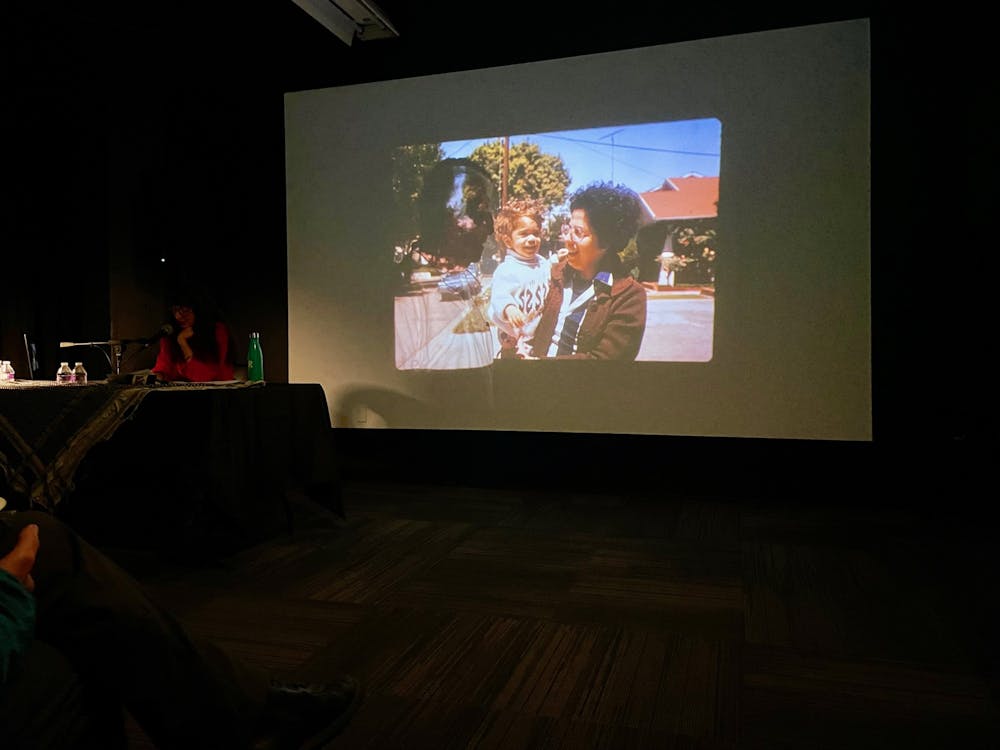Soft and quiet to loud and passionate, each piece takes on a new voice, like the spirit of the poem possesses the poet each time to give it a new life. They are experts at their craft, years of honing their skills, delivery and pieces. The poets hold captive their audience with exclamations of agreement, chuckles of laughter and deafening palpable silence at the weight of their words.
This past Saturday at Squeaky Wheel, an artist nonprofit organization that provides equipment, resources and education for those interested in the arts as well as for artists themselves, held a poetry reading for Carolina Ebeid and Joel Park downtown at the Tri-Main Center. The event was co-sponsored by UB’s Poetics Program, directed by Judith Goldman and Laura Marris of the English Department.
The event was hosted in the concrete industrial labyrinth that makes us the Tri-Main Center. Up vibrantly red interiored elevators, down winding passages tucked into a little back room, dark, cozy and lit only by the light of a projector. The room’s sparse furnishings are completed by the recent art installation, “The Image in its Absence,” which showcases fragmented scenes projected onto the walls of the screening room.
After a brief introduction from Squeaky Wheel’s curator Ekrem Serder, Joel Paul opened with his readings from his new book, “People Finder, Buffalo.” The poems, which featured a heavily politicized theme, were inspired by both local events, such as the Albright Knox Gallery’s firing of unionized workers, UB’s displacement of undocumented undergraduates from the dorms, as well as the incarcerated letters of pro-palestine protestors, currently serving in Batavia Federal Detention Facility. They were also inspired by personal events in Paul’s life, for instance, the grief of having a family member recently diagnosed with cancer. Paul’s poetry is deeply powerful, poignant and introspective, it points to the dissonance in our nation of needing something to appear right in front of us in order to take any interest in it.
“We can look at all these national events, and a lot of times we can imagine that they’re happening somewhere else,” Paul said. “I want to draw the connections to what’s happening in our own city and our own communities and our own institutions.”
After Paul’s reading left the audience all speechless (quite literally), the next poet Carolina Ebeid was introduced. Ebeid is a multimedia poet, who not only composes poems on paper but also visuals such as pictures, voiceovers and videos to accompany the readings of her poetry. The unique compositions of these videos often include archival material, home videos of her family, snippets of conversation, drawn animations and much more. The artistic aspect of her pieces creates a multidimensional experience that allows these poems to be engaged with and interpreted in new ways each time you come back to them.
“There’s a way in which the video makes the lines that I have… It brings something out of it. I explore them with video.” Ebeid explains it. It isn’t intentional necessarily, but there’s a way in which the poem extends, amplifies, deepens with the collaboration of a moving image, image and perhaps even more, sound with it.”
Small but impactful events such as these readings are so important to strengthening community bonds and deepening the bonds between ourselves and those around us, these connections in turn deepen and expand our experiences and how we engage with art. Art challenges our perceptions, biases and the principles we deem important. It forces us to ask the hard questions, what do we really believe in? What are we willing to do in the name of these beliefs? Art is the mirror of society; impossible to look at without seeing all the versions of ourselves, even the ones we wish to hide from.
Marina Noack is an assistant arts editor and can be reached at marina.noack@ubspectrum.com





